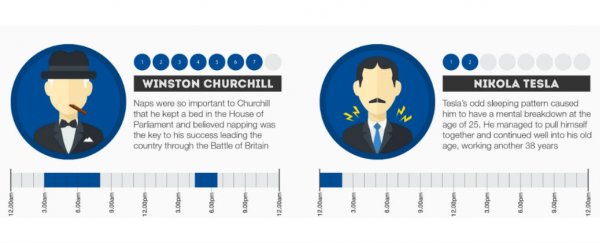Despite what science says about how crucial a good night's sleep is to your health and longevity, one thing's clear from the infographic below - some of history's most powerful and intelligent people had very little time for it.
Serbian-American inventor, engineer, and fan-favourite, Nikola Tesla, is said to have adopted what's probably the most ill-advised sleeping habit of them all - devoting just five hours a day to rest, only two of which were dedicated to actual sleep. And this wasn't something he implemented when he realised he had too many inventions and too little time. In his book, Prodigal Genius: The Life of Nikola Tesla, author John J. O'Neil says Tesla was terrible at sleeping, even when he was just a boy:
"By plugging the keyhole and the chinks around his door, he was able to spend the night hours reading volumes purloined from his father's bookshelves. Frequently, he said, he would read throughout the entire night, and feel none the worse for the loss of sleep. Eventual discovery, however, brought paternal discipline of a vigorous nature. He was about 11 years old at this time."
Which is adorable, but things got pretty serious for Tesla in adulthood. "Professors at the university warned Tesla's father that the young scholar's working and sleeping habits were killing him," says Gilbert King at Smithsonian Magazine. "But rather than finish his studies, Tesla became a gambling addict, lost all his tuition money, dropped out of school and suffered a nervous breakdown. It would not be his last."
While it's difficult to confirm, American inventor, Thomas Edison, and Leonardo da Vinci are both said to have adopted a polyphasic sleep cycle, which involves sleeping multiple times in a 24-hour period.
Of da Vinci's possible adoption of this practice, sleep researcher Claudio Stampi writes in his 1992 book, Why We Nap:
"One of his secrets, or so it has been claimed, was a unique sleep formula: he would sleep 15 minutes out of every four hours, for a daily total of only 1.5 hours of sleep. Therefore, it appears he was able to gain an extra six productive hours a day. By following this unique regimen, he 'gained' an additional 20 years of productivity during his 67 years of life."
More likely, argues Christopher Wanjek at LiveScience, those connected with the polyphasic sleep lifestyle were actually biphasic sleepers, which means they took longer naps twice a day.

You can view a larger version of the infographic here.
And speaking of sleep, this infographic breaks down everything your body does while you're not awake. It's making us tired just looking at it.
Source: Digg
